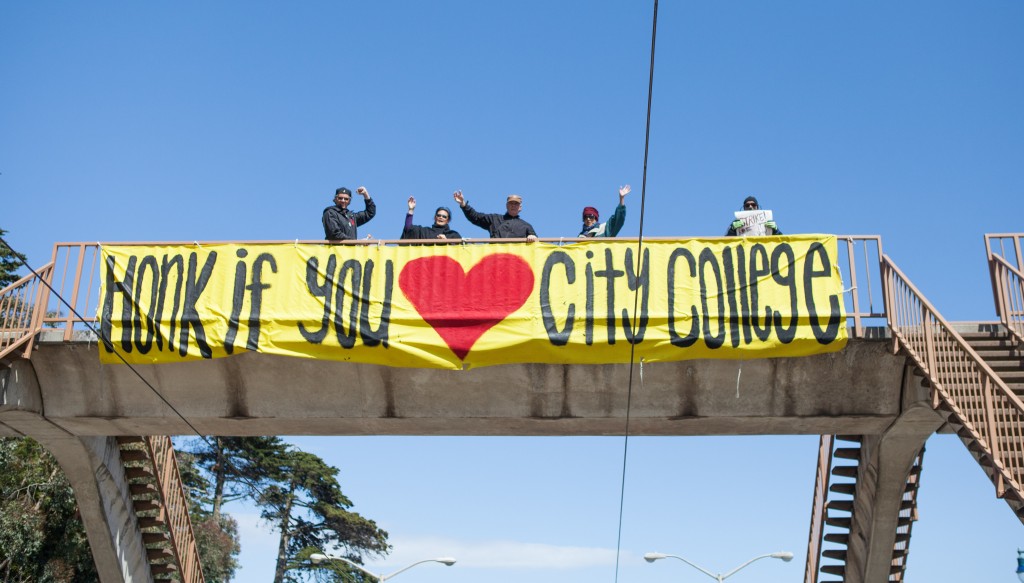Supervisor Kim Proposes Free City College

LOCAL LEGISLATION
By Audrey Garces
Following President Obama’s College Promise Act of 2015, several cities have worked to make the dream of free community college into a reality. Supervisor Jane Kim believes it’s time for San Francisco to follow suit and announced a Free City College proposal on April 19.
“We know that the biggest reduction in the state budget over the last 30 years was actually to higher education,” Supervisor Kim said. “Instead of investing in our prison industry—where we expect many of our adults to land because they have nowhere else to go—let’s invest in higher education, and let that be the institution that many of our residents get to go to.”
Other city supervisors, Board of Trustee members, students, the San Francisco Labor Council and American Federation of Teachers (AFT) 2121 members all gathered on the steps outside of City Hall in support of the proposal, standing behind a banner that read, “Honk if you love CCSF.”
The press conference was continuously interrupted by honking of support.
The Proposal
Free City College would grant free tuition to all San Francisco residents and workers who work half-time in San Francisco, like it was before 1984 in California. The proposal would not cover international students on F-1 visas or those paying Non-California Resident Fees.
For low-income students whose enrollment fees are already covered by federal or state financial aid, the proposal would make them eligible for up to $1,000 in educational support funds that could be put towards education-related costs like textbooks, transportation and childcare.
“San Francisco is going to lead the way,” said Tim Paulson, executive director of the San Francisco Labor Council.
The proposal must be approved by the Board of Supervisors before it appears on November’s ballot. If approved by San Francisco voters, it could be implemented as early as fall 2017. Supervisor Kim’s office stated in a press release that they are “contemplating a phased-in pilot program” for fall 2016.
“Our average age at City College is 27 years old. That means that our students are returning students coming back. They are people who are out of work,” Trustee John Rizzo said. “They are people who didn’t go to college and are tired of a life of ten years working at minimum wage, and they’re trying to come back to college.”
“Let’s invest in higher education, and let that be the institution that many of our residents get to go to.”
—District 6 Supervisor Jane Kim
It is estimated this proposal will serve more than 20,000 students and hopefully attract new students.
The Bay Area’s increasing cost of living, paired with the Accrediting Commission of Community and Junior Colleges’ threat to close the college, has driven enrollment down more than 30 percent over the past five years. Some students have been forced to choose between priorities such as school or rent or between food or textbooks, according to Supervisor Kim’s press release.
Speakers at the press conference continually reiterated that the proposal would benefit the city’s economy providing job mobility and opportunities for people that otherwise would not have been able to afford them.
“We know that if you have an associates degree at City College that you are on average going to make $11,000 more than someone who just has a high school diploma,” Supervisor Kim said.
The Funds
The proposal will cost an estimated $12.8 million, but Supervisor Kim proposed a new tax that would bring in $29 million in new General Fund dollars annually.
“We can not afford not to do this,” said Supervisor David Campos as he spoke about those who might call the proposal too costly.
In tandem with the Free City College measure, Supervisor Kim is proposing a mansion tax to be included on the ballot in November.
The tax would increase the already enforced ultra-luxury housing fee on all San Francisco property sales valued above $5 million by a quarter percent. For property sales above $25 million, the mansion tax will create an entirely new bracket and impose a three percent tax.
“We may not be able to stop the luxury housing market here in San Francisco, but we can certainly ask those that are buying homes above $5 million and above $25 million to pay more,” Supervisor Kim said.
Following the end of the press conference, those on City Hall’s steps exploded into a chant that was met with constant honking from passersby, “No cuts, no fees, education should be free!”
“We have to make sure to prioritize the new revenue to go into the pockets of our everyday residents, our middle class and working class residents,” said Supervisor Kim, “And make this a city for all of us.”
Contact a reporter
Send an email to: Audrey Garces or tweet @AudreyGarces
